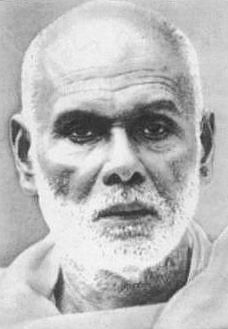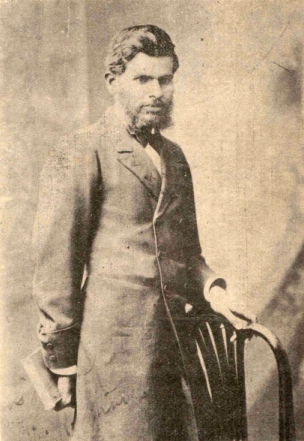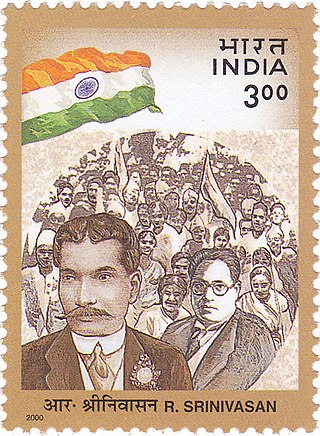Related Research Articles

Bhimrao Ramji Ambedkar was an Indian jurist, economist, social reformer and political leader who headed the committee drafting the Constitution of India from the Constituent Assembly debates, served as Law and Justice minister in the first cabinet of Jawaharlal Nehru, and inspired the Dalit Buddhist movement after renouncing Hinduism.

The Neo Buddhist movement is a religious as well as a socio-political movement among Dalits in India which was started by B. R. Ambedkar. It re-interpreted Buddhism and created a new school of Buddhism called Navayana. The movement has sought to be a socially and politically engaged form of Buddhism.

Jyotirao Govindrao Phule was an Indian social activist, businessman, anti-caste social reformer and writer from Maharashtra. His work extended to many fields, including eradication of untouchability and the caste system and for his efforts in educating women and oppressed caste people. He and his wife, Savitribai Phule, were pioneers of women's education in India. Phule started his first school for girls in 1848 in Pune at Tatyasaheb Bhide's residence or Bhidewada. He, along with his followers, formed the Satyashodhak Samaj to attain equal rights for people from lower castes. People from all religions and castes could become a part of this association which worked for the upliftment of the oppressed classes. Phule is regarded as an important figure in the social reform movement in Maharashtra.The honorific Mahātmā, was first applied to him in 1888 at a special program honoring him in Mumbai.
Untouchability is a form of social institution that legitimises and enforces practices that are discriminatory, humiliating, exclusionary and exploitative against people belonging to certain social groups. Although comparable forms of discrimination are found all over the world, untouchability involving the caste system is largely unique to South Asia.

Dalit, also some of them previously known as untouchables, is the lowest stratum of the castes in the Indian subcontinent. Dalits were excluded from the four-fold varna of the caste hierarchy and were seen as forming a fifth varna, also known by the name of Panchama. Several scholars have drawn parallels between Dalits and the Burakumin of Japan, the Baekjeong of Korea, the Hukou system of China and the peasant class of the medieval European Feudal system.

The Scheduled Castes and Scheduled Tribes are officially designated groups of people and among the most disadvantaged socio-economic groups in India. The terms are recognized in the Constitution of India and the groups are designated in one or other of the categories. For much of the period of British rule in the Indian subcontinent, they were known as the Depressed Classes.

The Temple Entry Proclamation was issued by Maharaja Chithira Thirunal Balarama Varma on November 12, 1936. The Proclamation abolished the ban on the backward and marginalised communities, from entering Hindu temples in the Princely State of Travancore, now part of Kerala, India.

Jagjivan Ram, known popularly as Babuji, was an Indian independence activist and politician from Bihar. He was instrumental in the foundation of the All India Depressed Classes League, an organisation dedicated to attaining equality for untouchables, in 1935 and was elected to Bihar Legislative Assembly in 1937, after which he organised the rural labour movement.

Young India was a book written by Lala Lajpat Rai in 1916 and later published by Mahatma Gandhi. Through this work, Mahatma Gandhi sought to popularise India's demand for independence or Swaraj.

Vitthal Ramji Shinde was a social and religious reformer in Maharashtra, India. He was prominent among the liberal thinkers and reformists in India, prior to its independence. He has been recognised as a social reformer and an activist fighting for greater equality in Indian society. He is particularly noted for opposing the practice of 'untouchability', and for championing support and education for 'untouchables', such as Dalits.

Sukhadeo Thorat an Indian economist, educationist, professor and writer. He is the former chairman of the University Grants Commission. He is professor emeritus in Centre for the Study of Regional Development, Jawaharlal Nehru University. He is an expert on B. R. Ambedkar.

Diwan Bahadur Rettamalai Srinivasan, commonly known as R. Srinivasan, was a Scheduled Caste activist and politician from then Madras Presidency of British India. He is a Paraiyar icon and was a close associate of Mahatma Gandhi and was also an associate of B. R. Ambedkar. He is remembered today as one of the pioneers of the Scheduled caste movement in India. He founded the Adi dravida mahajana sabha in 1893.

Hardas Laxmanrao Nagrale, popularly known as Babu Hardas, was an Indian Dalit leader, politician and social reformer. He was an ardent follower of B. R. Ambedkar and was pioneer of the practice of exchanging the greeting Jai Bhim amongst the Bahujans. He was also a prominent labour leader in the Central Province and was the general secretary of the Independent Labour Party in the province. Babu Hardas was also the first Member of the Legislative Assembly to be elected from Nagpur Kamptee constituency in 1937.

B. Shyam Sunder was born in Aurangabad district in Bombay Presidency, British India. His father was B. Manicham, a railway employee, his mother Sudha Bai and Manik bai younger sister. He was a political thinker, jurist, prolific writer, parliamentarian and a revolutionary leader. In 1937, he founded the Dalit-Muslim unity movement at Parbhani in Aurangabad, Maharashtra and urged his people to join hands with Muslims. He was a legislator representing Andhra Pradesh and Mysore State.

Annihilation of Caste is an undelivered speech written in 1936 by B. R. Ambedkar. The speech was to be delivered at an anti-caste convention held in Lahore by Hindu reformers. However, upon reviewing the written speech, the conference organizers deemed it too controversial, and subsequently revoked Ambedkar's invitation to the conference. Ambedkar proceeded to self-publish the speech, which gained widespread popularity and prompted translations into multiple Indian languages.
Harijan Sevak Sangh is a non-profit organisation founded by Mahatma Gandhi in 1932 to eradicate untouchability in India, working for Harijan or Dalit people and upliftment of Depressed Class of India. It is headquartered at Kingsway Camp in Delhi, with branches in 26 states across India.
Swami Achhootanand, also known as Achutanand or Hariharanand, was an Indian anti-caste intellectual, Dalit writer, and social reformer. A former Arya Samajist, he became disillusioned with the Arya Samaj and established the Adi Hindu movement. He was a poet, critic, dramatist, and historian.

Ambedkarism is called as the teaching, ideology or philosophy of B.R. Ambedkar, an Indian economist, barrister, social reformer, and the first of Minister of Law and Justice in the first cabinet of Jawaharlal Nehru. Ambedkarism includes special focus on subjects such as fraternity, democracy, communal electorates, conversion out of Hinduism, political power, rule of law, Navayana, among others. An Ambedkarite is one who follows the philosophy of Ambedkar. Icons of Ambedkarite ideology also include Periyar, Jyotirao Phule and others.
Muldas Vaishya was an Indian politician, activist and social reformer.
References
- 1 2 3 Guha, Ramachandra (2018). Gandhi : the years that changed the world, 1914-1948. Alfred A Knopf. ISBN 9780385532327.
- 1 2 3 Chakrabarty, Bidyut (2006). Social and Political Thought of Mahatma Gandhi. Routledge, Taylor & Francis. pp. 116–129. ISBN 978-0-415-36096-8.